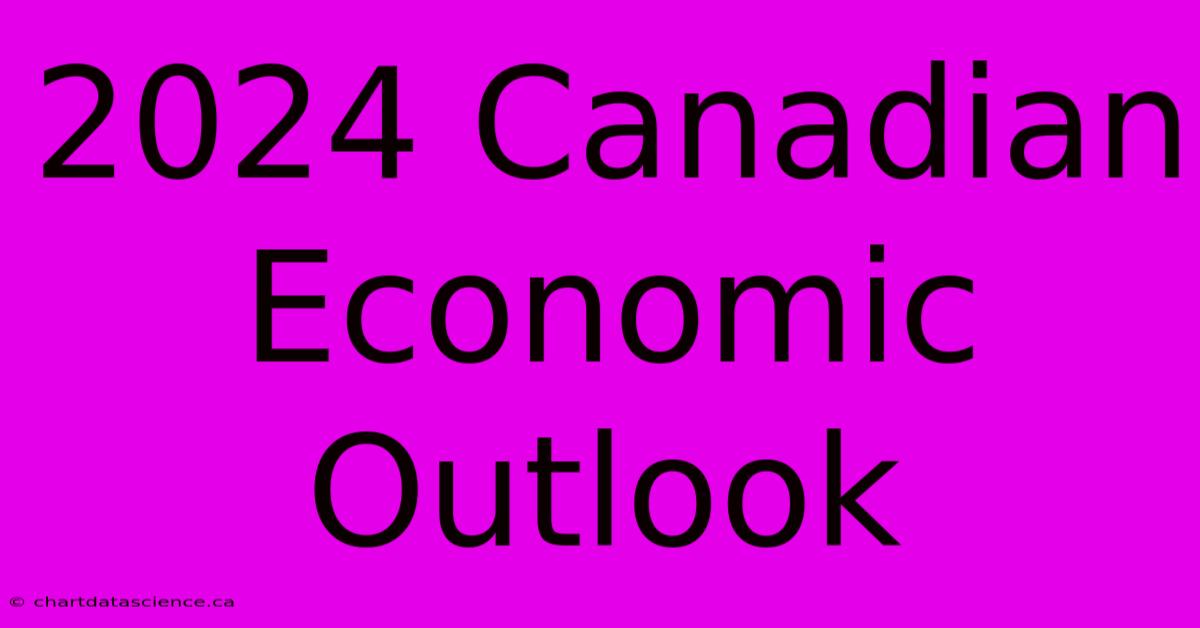2024 Canadian Economic Outlook

Discover more detailed and exciting information on our website. Click the link below to start your adventure: Visit My Website. Don't miss out!
Table of Contents
2024 Canadian Economic Outlook: Navigating Uncertainty
The Canadian economy faces a complex and uncertain landscape in 2024. While boasting strengths like a robust resource sector and a relatively strong labor market, significant headwinds threaten sustained growth. This article delves into the key factors shaping the 2024 Canadian economic outlook, exploring both potential opportunities and looming challenges.
Key Factors Shaping the 2024 Outlook
Several interconnected factors will significantly influence Canada's economic performance throughout 2024:
1. Inflation and Interest Rates: A Persistent Challenge
High inflation remains a primary concern. While showing signs of easing, inflation is still above the Bank of Canada's target range. The Bank's response – raising interest rates – aims to curb inflation, but this also carries the risk of slowing economic growth and potentially triggering a recession. The delicate balance between taming inflation and avoiding a sharp economic downturn will be a defining feature of 2024.
2. Global Economic Slowdown: Ripple Effects on Canada
The global economic climate is far from rosy. Slowdowns in major economies, particularly the US and Europe, will inevitably impact Canada's export-oriented sectors. Reduced demand for Canadian goods and services could dampen growth and affect employment levels. Understanding the global economic trajectory is crucial for accurately predicting Canada's economic performance.
3. Housing Market Correction: A Continuing Adjustment
Canada's housing market experienced significant growth in recent years, followed by a correction in 2023. This adjustment continues to play out in 2024, impacting consumer spending and investment. While a complete collapse is unlikely, the ongoing correction will influence overall economic activity.
4. Labor Market Dynamics: A Two-Sided Coin
Canada's labor market remains relatively strong, with low unemployment rates. However, labor shortages persist in certain sectors, hindering economic expansion. The ability to address skills gaps and attract and retain workers will be vital for sustaining growth.
5. Energy Sector Performance: A Mixed Bag
Canada's energy sector, a major contributor to the economy, faces a complex situation. High global energy prices provide an upside, boosting exports and revenues. However, challenges remain regarding environmental regulations, pipeline capacity, and global energy transition initiatives. The energy sector's performance will significantly impact overall economic growth in 2024.
Potential Scenarios for 2024
Several potential scenarios could unfold in 2024, ranging from a relatively soft landing to a more pronounced recession:
-
Soft Landing Scenario: Inflation gradually subsides, interest rate hikes are moderate, and the global economy avoids a significant downturn. This scenario would see moderate economic growth in Canada.
-
Moderate Recession Scenario: A more aggressive approach to curbing inflation leads to a noticeable slowdown in economic activity, potentially resulting in a mild recession.
-
Sharp Recession Scenario: A combination of factors, including a severe global downturn and a sharper-than-expected housing market correction, could trigger a more significant recession in Canada.
Navigating the Uncertainty: Key Considerations
Successfully navigating the economic uncertainties of 2024 requires proactive measures from both the government and the private sector. Fiscal and monetary policies must be carefully calibrated, balancing the need to control inflation with the desire to support economic growth and employment. Businesses need to adapt to changing economic conditions, focusing on diversification, cost management, and innovation. Consumers should adopt prudent financial strategies, managing debt levels and adjusting spending patterns.
Conclusion
The 2024 Canadian economic outlook is characterized by significant uncertainty. While the country possesses underlying economic strengths, navigating the challenges of high inflation, a potential global slowdown, and the housing market correction will require careful management and strategic adaptation. The outcome will depend on a complex interplay of domestic and international factors, making continuous monitoring and analysis essential.

Thank you for visiting our website wich cover about 2024 Canadian Economic Outlook. We hope the information provided has been useful to you. Feel free to contact us if you have any questions or need further assistance. See you next time and dont miss to bookmark.
Also read the following articles
| Article Title | Date |
|---|---|
| Philadelphia Eagles And Insurance Setbacks | Dec 17, 2024 |
| Little Big Town Country Musics Ascent | Dec 17, 2024 |
| Doubleheader Recap Vikings Bears Falcons Raiders | Dec 17, 2024 |
| Wisconsin School Shooting Suspect 15 Year Old | Dec 17, 2024 |
| Amber Alert Over 5 Year Old Found Safe In Florida | Dec 17, 2024 |
